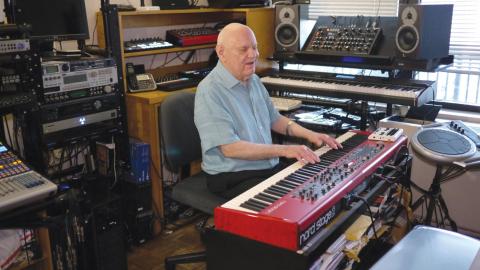From Synthesist to Activist

As a teenager, Mike Mandel ’70 had been fascinated by electronic music. So when he came to Berklee in 1968, he was excited to enroll in the school’s course in synthesizers. But because he is blind, Mandel couldn’t read the machines’ labels or see the diagrams in their instruction manuals.
The solution he and instructor Mike Rendish came up with was ingenious: “We used a braille map drawing tool I happened to have,” Mandel says. The tool could be rolled across braille paper to make indentations of lines and shapes. “Mike [Rendish] would draw waveforms and envelope shapes and other necessary information.” And suddenly, a whole range of new sounds had opened to Mandel.
He took quickly to the new technology and before long became known for his synth expertise as a member of Larry Coryell’s seminal fusion group, the Eleventh House. During a Boston gig, Mandel was even asked to demo the second ARP Odyssey ever built, because David Friend and Roger Powell of ARP Instruments wanted to hear the synthesizer with a live band.
By the late 1970s, Mandel had discovered a new series of synth-driven opportunities in New York City. After a brief stint programming synthesizers for advertising jingle studio sessions, Mandel started his own business recording synth demos for pop composers. Then, in the early 1990s, Mandel was called in to play on a marathon session for the soap opera Another World. “We did about 10 cuts in one night,” Mandel says. It was a thrilling challenge that would pave the way for Mandel’s next career move.
For more than 25 years now, Mandel’s written for major TV clients such as Warner Bros. Television and Heavy Hitters Music. His music has appeared on Entertainment Tonight, TMZ, and Extra, as well as All My Children, NCIS, The Good Wife, and The Ellen DeGeneres Show. TV writing “calls on all the genres, many that I’ve played throughout my life—country and jazz and rock and R&B,” he says. “All of those experiences have helped me write for television.”
As computer technology replaced analog synthesizers, Mandel says he became increasingly “interested in blind people getting involved in MIDI, and in blind people making a living in music.” This interest led Mandel into various leadership roles with the Friends in Art of the American Council of the Blind, and eventually brought him back to Berklee as an advocate for visually impaired students.
During the late aughts, Mandel began to work alongside Jack Perricone, then chair (now chair emeritus) of the Songwriting Department, to start a dialogue on campus about the need for a robust technological education for visually impaired students. The result of this dialog was that in 2010 Berklee opened the Assistive Music Technology (AMT) Lab, which trains visually impaired students to use accessible music software. “Mike was one of the key players who advocated for this program and connected us to a range of experts,” says Chi Kim, associate professor of music therapy, who was selected to lead the AMT lab.
Historically, Kim says, visually impaired students "felt cornered into performance majors.” But now, with more accessible technology and more robust training, "we have tons of other options. It’s very popular among visually impaired students to double-major.”
“When I came to Berklee,” Mandel says, “I found it took the better part of a semester before I found a methodology to keep up with my classmates.” But the AMT Lab has removed many barriers for the next generation of visually impaired students, making it easier for them to do what they came here for—what Mandel and every Berklee student has come here for—to learn their craft.




